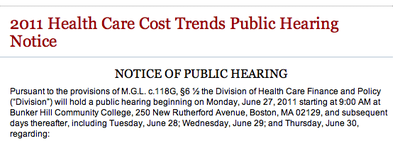Advertisement
The Great Divide: Policy Vs. Practice In Medicine
 9 days, 22 hours, 51 minutes.
9 days, 22 hours, 51 minutes.It's not the countdown to a major holiday, royal wedding or important presidential speech. Rather, it's the time remaining until the state Division of Health Care Finance and Policy holds its hearings on the costs of medical care and how to contain them. A wonky affair, for sure, but with particular resonance now because the cost of health care — and the fact that health care spending in Massachusetts is actually outpacing the nation — is a central theme this year, both in local and national politics and for the overall economy, with truly far-reaching implications.
As the state tries to rein in costs by replacing its long-standing fee-for-service payment system with global payments, whereby insurers put groups of doctors "on a budget," it's important to remember that we really aren't sure if this new system will actually save money and provide top-notch care.
As MIT economist Jon Gruber said to WBUR's Martha Bebinger: global budgets make a lot of sense in theory, “but in practice, what does it mean? What is the global budget? Who sets the global budget and for which payers? How much uprooting do you want to do, based on the limited evidence we have, that this will solve our theoretical problems? I think it’s great we’re having this conversation. I just think it’s premature to say it’s a solution.”
A thoughtful piece by Dr. Pauline Chen in The New York Times offers an important reminder that well-meaning policy doesn't always align with the practice of medicine. She relates the story of a colleague, a pediatrician who "recently bemoaned the fact that several insurers in his state no longer reimburse him for each medical service he performs. Instead, the insurers give his practice a budget for each patient, and he can earn more by meeting certain quality goals."
“I’m all for quality,” he said, sighing. “I just don’t think this is quality.”
One of his insurer’s quality requirements, he recounted, is testing all sexually active girls for chlamydia, a sexually transmitted disease. But because the insurers cannot read every single patient’s medical chart, they determine whether a girl is sexually active by other means: They check whether she takes birth control pills.
The problem is that many of my colleague’s patients are taking those pills not for contraception, but for acne and menstrual pain.
“So do I skip the testing for chlamydia and fail my quality standards?” he asked. “Or do I order a test that the patient doesn’t need and that will probably not be covered by her insurance?”
Chen's point, I think, is that before huge systemic changes are put into place, we should be pretty sure they've been tested and measured so we can evaluate the consequences, both intended and unintended.
Let's see what the policymakers have to say about it all at the hearings on cost trends and how to contain them, now 9 days, 22 hours and 30 minutes away.
This program aired on June 17, 2011. The audio for this program is not available.
